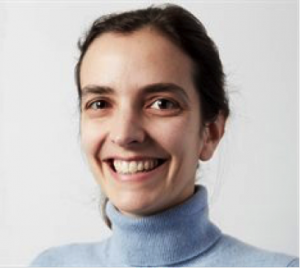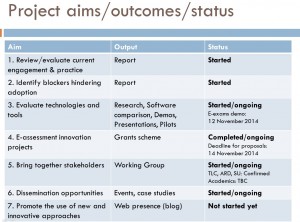SADL and Statistics: an interview with Professor Pauline Barrieu
Dr Jane Secker, Programme Manager for SADL caught up with Professor Pauline Barrieu, Deputy Head of Department in Statistics at LSE. Statistics students have always made up an important part of the student ambassador cohort and this year seven of the nine Senior Ambassadors, providing support for the programme, were from this department. Jane was interested to know why digital literacy might be so important to Statistics students, what this programme might also be offering the group and the impact it might have had on the department more widely.
Jane: Why do you think Statistics students are so engaged with SADL?
Pauline: I think there are some clear reasons why the programme appeals to our students, many of whom are actually taking the Actuarial Science programme or the Business Mathematics and Statistics (BMS) programme. Understanding data and information is a fundamental part of statistics. Being about to manipulate data, to work with data is a really important skill, so I think digital literacy is something that our students also recognize as an important part of their curriculum. I also think our undergraduate students are very focused young people. They know what they want to do at 18 and they recognize the importance of issues such as data confidentiality. They know this is going to be very important in their future careers so I think they see the benefit of this programme.
Jane: Do you think your students from the Actuarial Science programme are different from other undergraduates at LSE then?
Pauline: This programme has fewer optional courses, the students are very focused, they have a clear idea of what they would like to do as a career, which I personally find very impressive for people of that age! During our ASC review last year, Paul Kelly mentioned how mature and articulated our students were – they seem to be very focused and know what they want.
Coming back to SADL, I think the flatter structure of the progamme, how they are taught as your peers also appeals to them as it’s different to what they experience in our classes. Some of the experiences they have, for example, acting as a Senior Ambassador and providing peer support to others helps to develop their confidence. It’s also great to give students experience of giving presentations and attending conferences with the SADL staff.
Jane: Do you think SADL has had a wider impact on your department?
Pauline: I know many of our lecturers are very keen to be more innovative in their teaching. Statistics do a lot of general courses open to students across LSE who need to learn about statistical analysis. Almost every social scientist needs to understand some form of stats, so we do a lot of teaching of students from a qualitative background where maths and stats is quite alien or difficult for them. It’s really important to try and engage those students and find creative ways of teaching them. One of our lecturers, Sara Geneletti recently applied for a Learning Technology grant from LTI to look to improve assessment on her course. Our in-coming Deputy Head of Department, Irini Moustaki is also very interested in innovations in teaching and working more closely with LTI to use technology effectively. And of course we have James Abdey in Statistics who has won a number of prizes for his teaching and was highlighted as an Innovator in your recent series. This is not an exhaustive list of people and innovation is something really important to lecturers in my department as a way of engaging students with the subject.
Jane: What more could LTI do to help support your department?
Pauline: I think every department across LSE is doing some fantastic things in terms of their teaching. However we don’t always know about these innovations so I think it’s important that LTI share these experiences across the school. One of the biggest problems that gets in the way of this is how busy we all are with so many emails, meetings, reviews, teaching and research. We need some really short guides to give us ideas of what others are doing. Your Innovators series looks great for doing this, to give us ideas for our own teaching in a short digestible form, ideally I would like a version I can read off line too though.
Jane: Is there anything else you can tell me about SADL, digital literacy or learning technologies?
Pauline: I’m interested in why you just focus on undergraduates? I think masters students also need to develop these skills, although of course they spend less time at LSE, so the peer support aspect would work less well. But I think PhD students in quantitative subjects need more help and support around digital literacy. I know the Library offer a course on how to do a literature review, but it would be great to focus a course for our students who publish their thesis by papers, so have quite a different experience. In addition some of our PhD students are sponsored by a private company so there are differences in issues such as ownership of the data in the thesis. We have a standard agreement with the sponsors, but it’s quite different to other departments.
Jane: That’s a really interesting point, and we do try to offer workshops and support for PhD students in LTI with colleagues in the library. But it sounds like we could do more?
Pauline: I also think it’s really important to teach PhD students about this because many of them work as Graduate Teaching Assistants (GTAs), so teach our undergraduates. In Statistics we have developed a dedicated training for our GTAs, so we will certainly make sure they know about SADL, so they can encourage students to get involved in the programme. Overall, I’m really pleased with this programme, which I think is of great benefit to our undergraduate students, and I am proud so many of them have got involved in SADL.
Jane: It’s been great talking to you Pauline, good luck next year when you take over as Head of Department and I’d just like to thank your department and your wonderful students, who have been an inspiration to me and the SADL teaching team.
Original post taken from the SADL blog











